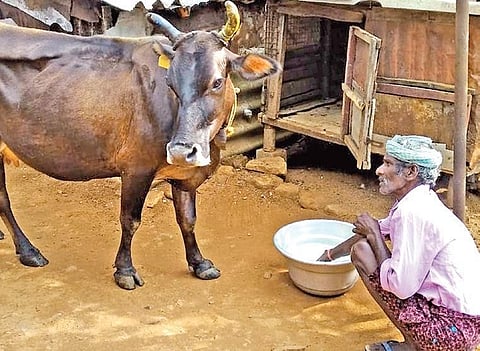

TIRUPPUR: Lack of awareness of herbal veterinary medicines (Ethno Veterinary Medicine) is forcing farmers to choose costly chemical formulations. For example, simple herbal formulations for Mastitis made from Aloe vera, Turmeric and Calcium oxide cost just Rs 40 whereas allopathic medicines cost more than Rs 400. There are more than 20 herbal formulations accepted and followed in National Dairy Development Board (NDDB) and Tamil Nadu Veterinary and Animal Sciences University (TANUVAS).
Gopal, a dairy farmer in Kangeyam, said, 'Though I am not aware of the herbal other traditional medicines for cattle, I sought the advice of local villagers for a few diseases related to the cattle. But most of the time, I call the veterinarian. Not just me, almost all the dairy farmers are not aware of all herbal medicines for cattle. Even for a small infection, they refer to veterrhic medication'.
Confirming the issue, Senaapathy Kangayam Cattle Research Foundation - Chairman Karthikeya Senaapathi said,'Kangeyam and other native breeds of cattle are less prone to diseases and infection. Due to a strong immunity foundation, they are more resistant to disease. Besides, I used all herbal formulations prescribed by Tamil Nadu Veterinary and Animal Sciences University(TANUVAS) for cattle in my research centre and farmland. All herbal formulations are relatively cheap. But, lack of awareness among farmers is the primary cause'.
Elaborating, Ethno-medicine Researcher Dr Punimoorthy said, 'For more than 20 years, I have been into the research of EVM. Our knowledge of herbs for health care is an ancient practice in India that can be traced back thousands of years. This knowledge of the therapeutic use of herbs is acquired through family tradition and folklore, handed down by word of mouth. I have developed more than 40 herbal formulations of Ethno Veterinary Medicine (EVM). These can provide low-cost solutions to some of the health problems of our livestock, especially in rural areas. Furthermore, patents / Bio-piracy issues may be tackled effectively by using EVM. For the increasing number of poor farmers, cost-effective treatment will be a priority in the coming years. Conditions like wounds and inflammation, gastroenteritis, rumen disorders, endo and ecto parasitism, reproductive disorders, mastitis in rural livestock have been successfully treated (exclusively with herbal preparations). They were highly effective against Foot and Mouth disease (FMD) in 2013. I am happy these herbal formulations are accepted by NDDB and TANUVAS.
Elaborating on the lack of awareness, Punimoorthy said,'Not just farmers, even veterinarians are not giving importance to it. Besides, EVM is not included in the curriculum of Veterinary Science in universities. Furthermore, no publicity for herbal medicines, leave alone EVM. Many researchers still believe, EVM is not mainstream science'.
According to an official from Tamil Nadu Veterinary and Animal Sciences University(TANUVAS) said, The university is making all efforts to promote EVM (Herbal Veterinary medicines) through workshops and camps. But, we cannot pressurize the farmers. Furthermore, it is a matter of choice and farmers often go to chemical formulations for instant and immediate relief for cattle diseases and some EVM take time for curing the diseases'.